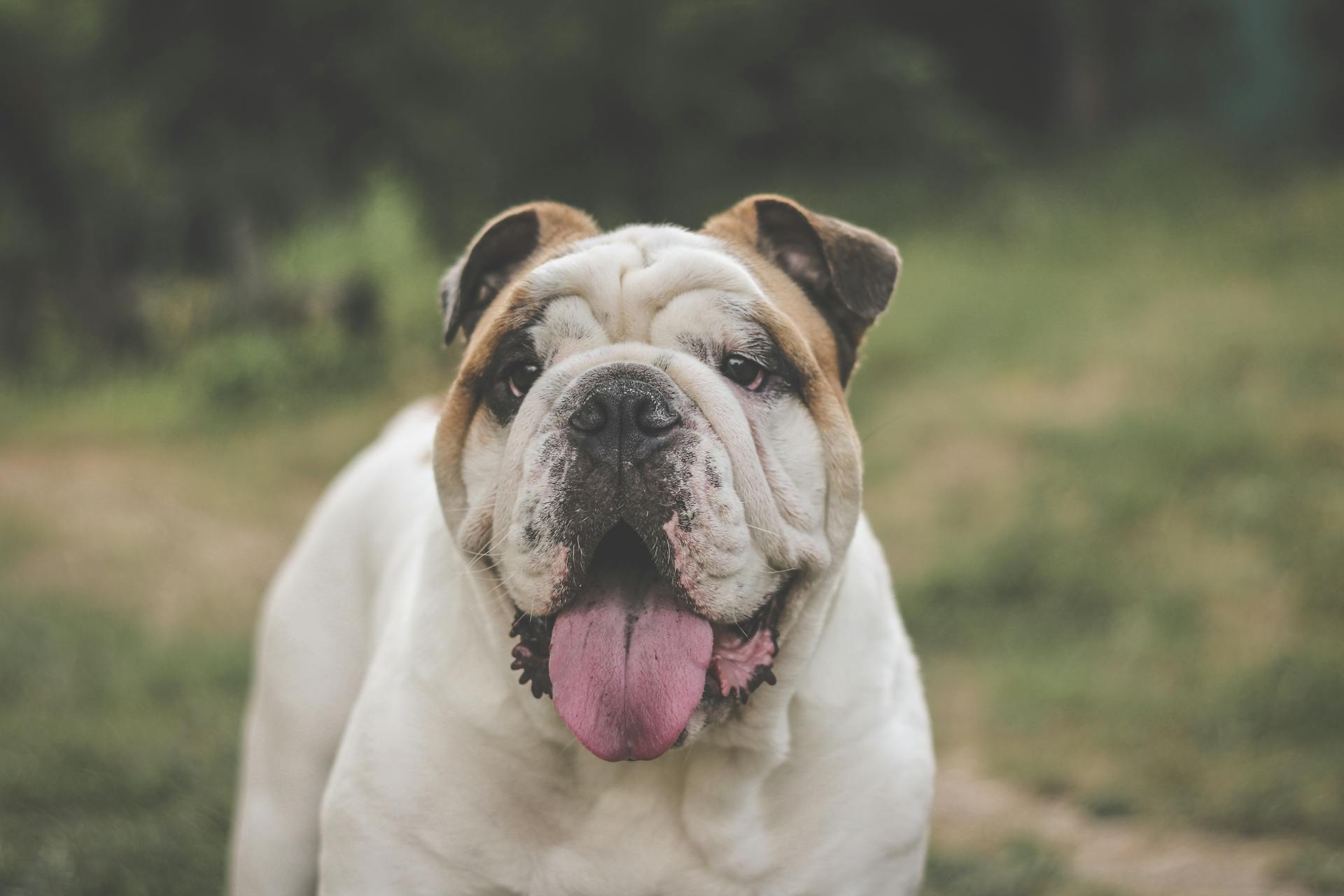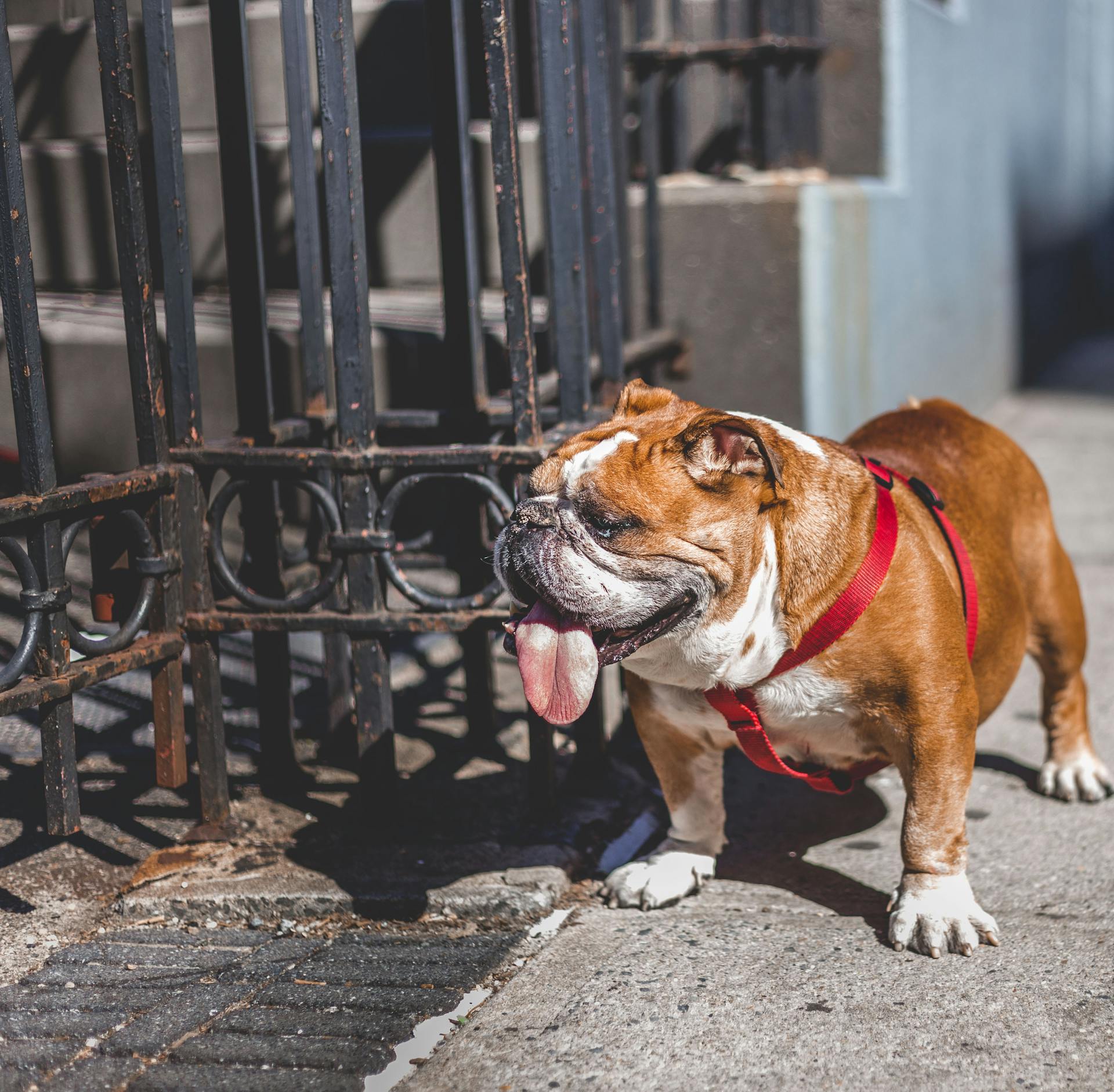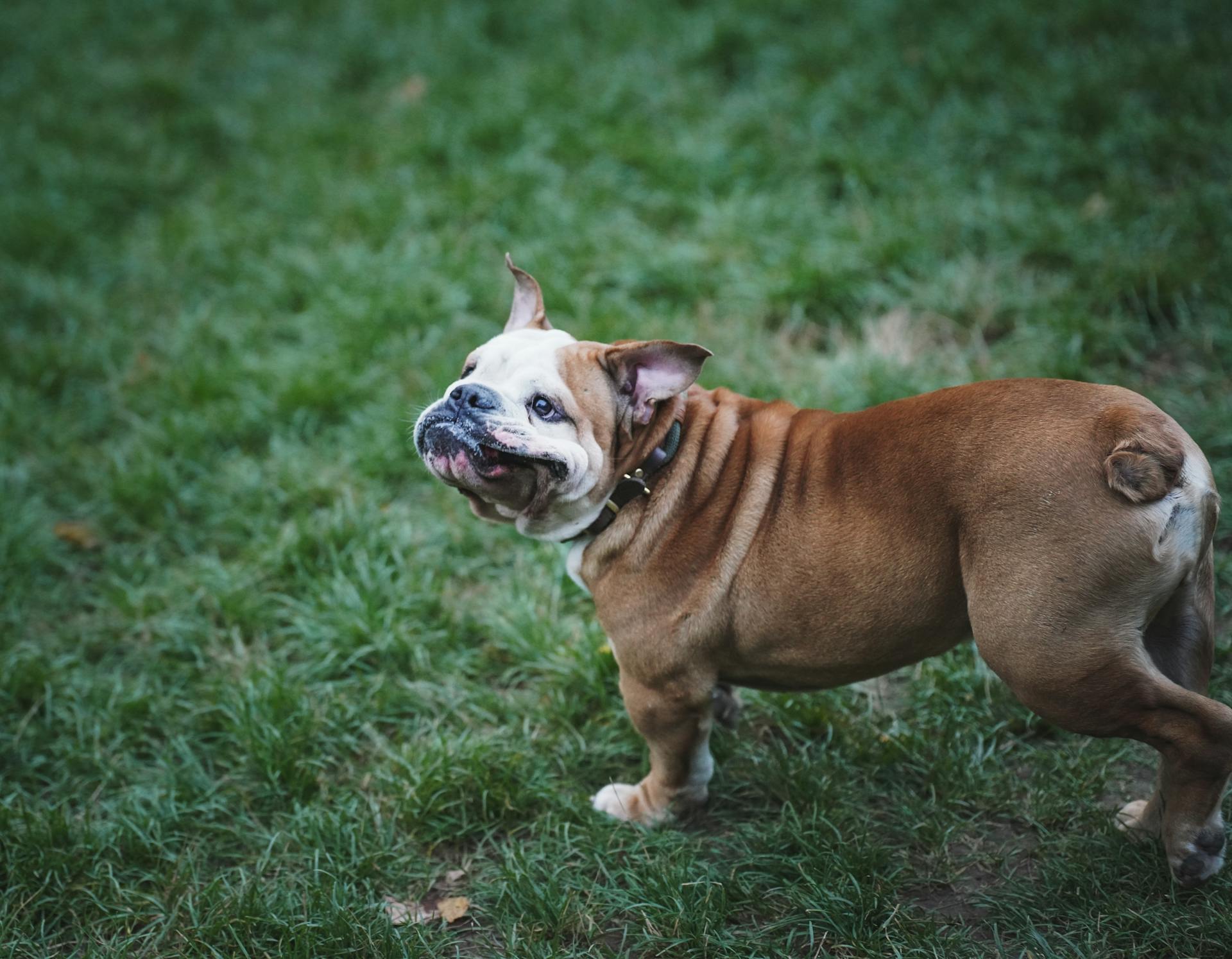
English Bulldogs are prone to diarrhea due to their unique digestive system, which can be sensitive to changes in diet or environment.
Their short, compact gut means they have less time to digest food, leading to potential issues.
Diarrhea in English Bulldogs can be caused by eating spoiled or high-fiber foods, which can be difficult for them to digest.
Infections from bacteria, viruses, or parasites can also cause diarrhea in English Bulldogs.
Causes and Symptoms
English bulldog diarrhea can be a real pain for both you and your furry friend. If your bulldog's diarrhea lasts more than a day or two, or if they look unwell, contact the veterinarian without delay.
The symptoms of diarrhea can vary, but common signs include dehydration, watery stool, explosive stool, and increased frequency of bowel movements. Your bulldog may also strain to defecate, have accidents indoors, or show abdominal pain, fever, listlessness, and weight loss.
Some common causes of diarrhea in English bulldogs include eating garbage or spoiled food, medications such as antibiotics, stress or anxiety, intestinal cancer, and colitis. They may also ingest poisons or toxins, foreign objects, or develop viral infections like distemper or parvovirus.
Here are some potential causes of diarrhea in English bulldogs:
If you suspect your English bulldog has diarrhea, it's essential to monitor their symptoms and consult with a veterinarian to determine the underlying cause and develop a treatment plan.
Causes and Symptoms
Causes of diarrhea in dogs can be varied and often linked to their diet. Many dogs experience diarrhea after eating something that irritates their stomach, such as food that's high in additives and artificial flavoring. This can be a sign that their system is reacting poorly to the food.
Dogs can also get diarrhea from eating human food, especially if it's spoiled or not meant for them. If you're changing your dog's diet suddenly, without a transition period, it can cause digestive problems and diarrhea. Some dogs may even get diarrhea from eating garbage or other foreign substances.
Infections like worms, bacterial infections, and viral infections can also cause diarrhea in dogs. If your dog has been eating from the garbage or has been in contact with other animals that may have worms, it could lead to a worm infestation and diarrhea. Similarly, if your dog has been exposed to bacteria or viruses, it can cause a range of symptoms, including diarrhea.
Related reading: English Bulldog Diet
Some common causes of diarrhea in dogs include:
- Eating garbage or spoiled food
- Medications like antibiotics
- Stress or anxiety
- Intestinal cancer
- Colitis
- Pancreatitis
- Change in treats or overall diet
- Ingesting poisons or toxins
- Ingestion of foreign objects
- Viral infections like distemper, coronavirus, or parvovirus
- Liver or kidney disease
- Inflammatory bowel disease
- Parasites like Giardia, coccidia, whipworms, roundworms, or hookworms
- Bacterial infections like salmonella
Symptoms of diarrhea in dogs can vary, but often include loose, watery stools, vomiting, and abdominal pain. If your dog has acute bloody diarrhea, it's essential to seek veterinary attention immediately, as it can be a sign of a more serious underlying condition.
Symptoms
If your dog is experiencing diarrhea, it's essential to be aware of the symptoms that may indicate a long-term issue. Dehydration is a significant concern, and if you notice your dog is not drinking enough water, it's a good idea to contact your veterinarian.
Watery stool is a common sign of diarrhea, but it can also be a sign of other underlying issues. Explosive stool can be a mess to clean up, but it's also a sign that your dog needs to go to the bathroom urgently.
Your dog may have an increased frequency of bowel movements, which can be stressful for both you and your pet. This is especially true if your dog is having accidents indoors. Straining to defecate can be painful for your dog, and it's a good idea to monitor their behavior.

If your dog is experiencing abdominal pain, it's a clear sign that they need veterinary attention. Fever is another symptom that should not be ignored, and if your dog is listless and weak, it's a good idea to contact your veterinarian right away.
Fluid accumulation in legs, abdomen, or chest can be a sign of a more serious issue, and weight loss is a common symptom of chronic diarrhea. Dull and brittle fur can be a sign of malnutrition, and vomiting can be a sign of an underlying issue.
Some other symptoms to look out for include blood or mucus in stool, low appetite, and depression. These symptoms can be a sign that your dog needs veterinary attention, and it's always better to err on the side of caution.
Here are some common symptoms of long-term diarrhea in dogs:
- Dehydration
- Watery Stool
- Explosive stool
- Increased frequency of bowel movements
- Urgency of bowel movements
- Straining to defecate
- Accidents indoors
- Abdominal Pain
- Fever
- Listlessness and weakness
- Fluid accumulation in legs, abdomen or chest
- Weight loss
- Dull and brittle fur
- Vomiting
- Blood or mucus in stool
- Low appetite
- Depression
Diagnosis and Treatment
To diagnose the underlying cause of your English bulldog's diarrhea, your veterinarian will take a detailed history to figure out if your dog was exposed to anything that may have triggered their diarrhea. A thorough physical exam will also be performed to check your dog's overall health and find abnormalities such as fever or abdominal tenderness.
A stool sample analysis can point to a parasitic infection, and a complete blood count, electrolyte panel, and urinalysis may be done to help diagnose the cause of the diarrhea. These tests can indicate if there is an infection of a bacterial, fungal, or viral type.
If your veterinarian suspects a bacterial or viral infection, they may prescribe antibiotics or other medications to help clear up the infection. In some cases, hospitalization may be necessary to stabilize your pet and return system levels to normal ranges.
Treatment for English Bulldog Diarrhea
Treatment for your English bulldog's diarrhea depends on the underlying cause, but it often begins with treating any underlying illnesses or diseases that may be affecting your pet. If your dog is very sick or dehydrated, hospitalization and intravenous therapy may be necessary to stabilize your pet.
In some cases, withholding food for 12 to 24 hours can allow the intestine to calm down, and fluid therapy may be needed to replace lost fluid and correct electrolyte imbalances. Antibiotics may be prescribed to clear up or prevent a bacterial infection, and anti-parasitics may be used to treat intestinal parasites.
Here are some potential treatments for English bulldog diarrhea:
- Withholding food for 12 to 24 hours
- Fluid therapy to replace lost fluid and correct electrolyte imbalances
- Antibiotics to clear up or prevent bacterial infections
- Anti-parasitics to treat intestinal parasites
- Diet change to help control symptoms
What Are the Types of?

There are three different types of diarrhea that dogs can have. Acute watery diarrhea is abrupt and runny, making it clear that your dog needs to go outside right away.
This type of diarrhea can be accompanied by blood, which can be present in several forms. You might see black tarry stools, bright red streaked stools, or stools with red or pink color, indicating bleeding in the colon, rectum, small intestine, or stomach.
If your dog has hemorrhagic gastroenteritis, they may also be vomiting, and you should take them to the vet immediately.
Chronic diarrhea is a severe condition that requires veterinary attention if it lasts for more than twenty-four hours. Dehydration from water loss in the stool is a serious risk, so don't hesitate to take your dog to the vet.
Here's a summary of the types of diarrhea:
- Acute watery diarrhea: abrupt and runny, may be accompanied by blood
- Acute bloody diarrhea: more serious, with blood present in the stool
- Chronic diarrhea: severe condition that requires veterinary attention if it lasts for more than twenty-four hours
Veterinarian Diagnosis
To determine the underlying cause of your dog's diarrhea, veterinarians will typically take a detailed history of your dog's symptoms and exposure to potential triggers. This includes asking about the length of time your dog has been experiencing diarrhea, whether it's worsening or staying the same, and if your dog has had access to garbage or spoiled food.
A thorough physical exam is also crucial, as veterinarians will check for signs of fever, abdominal tenderness, or other abnormalities that could indicate a more serious issue.
Blood work, including a complete blood count (CBC) and biochemistry profile, can help identify issues such as kidney and liver disease, infection, and dehydration. Fecal exams can also be done to detect intestinal parasites.
If your dog has been exposed to potential triggers such as parvovirus, a parvo test may be recommended. X-rays may be taken in cases of potential foreign body blockage.
In some cases, an intestinal biopsy may be necessary to determine the cause of diarrhea. A food elimination trial may also be suggested if your veterinarian suspects a food allergy.
Here are some diagnostic tests veterinarians may use to diagnose dog diarrhea:
- History: Detailed account of your dog's symptoms and exposure to potential triggers
- Physical exam: Thorough nose-to-tail exam to check for signs of illness
- Blood work: Complete blood count (CBC) and biochemistry profile to identify underlying issues
- Fecal exam: Detection of intestinal parasites
- Parvo test: To rule out parvovirus infection
- X-rays: To check for foreign body blockage
- Biopsy: To examine intestinal tissue for abnormalities
- Food elimination trial: To identify potential food allergies
Treatment
Treatment is a crucial step in helping your furry friend feel better. Your veterinarian will start by treating any underlying illnesses or diseases that may be causing the diarrhea.
Hospitalization may be necessary if your dog is very sick or dehydrated. Intravenous therapy can help stabilize your pet and return system levels to normal ranges.
If bacteria or worms are present, your veterinarian will prescribe antibiotics or deworming drugs. Antidiarrheal medicine may also be given, depending on the cause.
In some cases, withholding food for 12 to 48 hours can allow the intestine to calm down. This is especially helpful for cases of dietary indiscretion.
Fluid therapy may be needed to replace lost fluid and correct electrolyte imbalances. Your veterinarian will recommend a good diet to help control your dog's symptoms if they have a food sensitivity.
A high fiber diet combined with anti-inflammatory drugs may be prescribed for large intestinal diarrhea.
Suggestion: Best Food for Olde English Bulldog
Sources
- https://cvhcp.com/blog/my-dog-has-diarrhea-but-is-acting-fine-what-do-i-do/
- https://wagwalking.com/condition/diarrhea-long-term
- https://www.fallsroad.com/site/tips-resources-blog-baltimore-vet/2021/10/12/diarrhea-dogs
- https://iheartdogs.com/6-remedies-supplements-for-your-bulldogs-diarrhea-gas-vomiting-or-upset-stomach/
- https://www.petmd.com/dog/symptoms/dog-diarrhea
Featured Images: pexels.com


